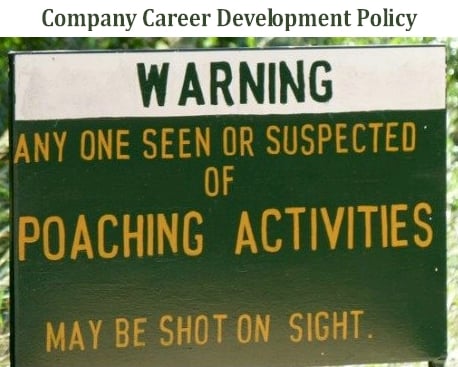In a hidden valley many thousands of years ago… “So, where do you see yourself in 50 moons’ time?”
: :
In a hidden valley many thousands of years ago… “So, where do you see yourself in 50 moons’ time?”
: :
 The H-1B visa is well-known in technology circles: U.S. employers use it to hire temporary foreign workers in “specialty occupations.”
The H-1B visa is well-known in technology circles: U.S. employers use it to hire temporary foreign workers in “specialty occupations.”
Engineers and Information Technology (IT) workers have long complained that the H-1B program takes jobs away from Americans. While H-1B requires employees to be paid the prevailing wage, some argue that employers actually pay lower salaries to H-1B workers — and that this depresses salaries across the board.
While there is a cap on the number of H-1B visas issued in the U.S., there is no cap on the L-1 visa, which has no prevailing wage requirement.
 The L-1 visa is used by foreign companies for intra-company transfers of foreign employees into the U.S. L-1 workers are supposed to have “specialized knowledge” — but my dog could claim that his nose enables him to fulfill that requirement.
The L-1 visa is used by foreign companies for intra-company transfers of foreign employees into the U.S. L-1 workers are supposed to have “specialized knowledge” — but my dog could claim that his nose enables him to fulfill that requirement.
Use of the L-1 visa is growing, in part because the definition of “specialized knowledge” makes it easier to abuse.
Computerworld reports in an article, Charting H-1B users, as attention shifts to L-1, that, according to the Economic Policy Institute (EPI), L-1 could start resulting in significant job losses for Americans. EPI warns of “offshore outsourcing firms whose business model is to first hire L-1 workers to learn the work done by Americans, then to transfer that work overseas.”
Says an EPI analyst: “The L-1 program was not intended to function in this way. Nevertheless, this blatant misuse of the program is legally permissible. As a result, the program is operating at the expense of American workers.”
 The issue: The U.S. government is considering changing the definition of “specialized knowledge,” and EPI is warning that the new definition could cause new, more extensive job losses. Are American jobs being led out of the country on L-1 leashes? I mean, L-1 visas?
The issue: The U.S. government is considering changing the definition of “specialized knowledge,” and EPI is warning that the new definition could cause new, more extensive job losses. Are American jobs being led out of the country on L-1 leashes? I mean, L-1 visas?
Meanwhile, foreign companies that want to transfer more of their employees to work in their U.S. facilities complain about the restrictions.
Have you encountered L-1? Is it the new H-1B?
: :
In the March 27, 2012 Ask The Headhunter Newsletter, a business owner defends business cards:
I just read an article in the L.A. Times that says Passing out business cards is quickly becoming passe. Instead, I’m supposed to “bump” my phone with someone else’s to trade contact information. If cards are optional, then so are new clients and referrals. The end of that article points out that in the world’s fastest growing market, Asia, you’d better have a card because it’s crucial. I run a successful small business and I think anyone who doesn’t carry business cards is naive. Do you use business cards?
Hmmm… what do Asians know that the rest of us don’t?
I run an online publishing business, and “digital” is an enormous part of my work and life. If there’s a way to do something more effectively or efficiently, I take advantage of it. Sometimes, digital technology enables us to do things we could never do without it — like publishing this newsletter and my books.
But I do carry business cards, and I don’t intend to give them up. Guess I’m good to go to Asia.
Last week I gave a presentation, and afterwards I had a cup of coffee with one of the attendees — who is a potential client. She asked me for a business card. Suppose I’d told her, “I don’t use business cards. Find my e-mail address on my website.” I’d have broken the pace of our discussion. It would not have helped.
 I do a lot of business online and I don’t always meet my clients, so there’s not always a chance to use a business card. But for those in-person meetings and work sessions, cards are a necessity. I’ve encountered some people who don’t have a card to share, and sometimes — not always — this sends a bad signal. I quickly assess whether the person has a viable business, or is just knocking around, trying to get lucky. It affects how I judge them. Is that fair? I don’t think that matters. I know other business people who react the same way. Cards are cheap; so’s a simple website. If you’re too cheap to have both, you may not be worth talking to.
I do a lot of business online and I don’t always meet my clients, so there’s not always a chance to use a business card. But for those in-person meetings and work sessions, cards are a necessity. I’ve encountered some people who don’t have a card to share, and sometimes — not always — this sends a bad signal. I quickly assess whether the person has a viable business, or is just knocking around, trying to get lucky. It affects how I judge them. Is that fair? I don’t think that matters. I know other business people who react the same way. Cards are cheap; so’s a simple website. If you’re too cheap to have both, you may not be worth talking to.
But there are lots of subtle benefits to cards. Some people are in too much of a hurry to recognize them.
If you want to encourage someone to talk to you again, it’s easy to offer your card. Asking for their e-mail address or getting them to jot down yours is a bit more awkward. (Not all phones “bump.”) Contrary to what that article suggests, cards are not all tossed in the trash. I have a large digital contact list, but I also have a well-organized box of cards that I refer to often.
I can write a note on the back of a card, to personalize the memory someone has of me. And when they give me their card, I can jot a note on theirs, too. I could do it on my Droid, but so what? That card stays on my desk for a while and reminds me of the person. If the information is only in my phone, I won’t see it until I have reason to search for it.
A university professor is quoted in that article: “It’s time-consuming to organize business cards — and not portable.” That’s pretty naive. New contacts earn their way into my phone. Many start out as cards. If I need them more than once or twice, I add them to my digital list.
One last reason cards are good: Design. A person’s card tells me as much about their brand as their website does. Do they care how they come off?
What’s most unfortunate about the article is its self-righteous tone. It pits “under-30” and “young and Web-savvy people” against… who? Over-thirty and Web-ignorant people? Gimme a break.
The real punch line in the article reveals how gratuitous it is. “Firms that do business abroad, particularly in Asia, have found printed business cards to be crucial to corporate culture and ritual there.” In one of the fastest-growing markets, cards are crucial. Did someone miss a bigger point when writing this article?
Why come off like a clueless dork? Carry cards as well as one of those digital communication thingies, what do you call it? A smartpod? A pad thingy. You know what I mean — here, I’ll write it down on my card for you… Call me. We’ll do lunch.
Do you use business cards? Are they on the way out? What do Asians know that the rest of us don’t? Do biz cards offer anything that digital doesn’t? Post a comment… or write me a letter…
: :
In the March 20, 2012 Ask The Headhunter Newsletter, a reader worries that disclosing salary history to an employer is not a good idea…
What’s the best way to deal with an interviewer who wants to know my salary history and salary requirements? While I know employers always ask this, I feel it takes away from my edge when I divulge that information.
You’re absolutely right — to a point. When you show your salary cards at the wrong time, your negotiating edge disappears. When employers ask for salary requirements, they usually follow up quickly with a question about your salary history. Then they use your last salary to limit any offer they make. And that’s why you need to take control of the discussion.
You should avoid disclosing your salary history, while expressing your desired salary as a range you can justify and defend. The best way to negotiate a good salary deal is to demonstrate that you’re worth it.
In my opinion, discussing salary history is a no-no. It’s no one’s business. Some employers will object, but keeping your past salary confidential is pure common sense because it directly affects your ability to negotiate. Although an employer may suggest that your old salary is a good indicator of your value, the truth is that it’s up to her to make an independent assessment of your value to her business.
: :
 Your salary is nobody’s business. Disclosing it can cost you a big raise.
Your salary is nobody’s business. Disclosing it can cost you a big raise.
Learn to say NO firmly and with authority when employers demand your salary history — to make them say YES to the best possible offer.
It’s all in my new PDF book:
BONUS: I’m throwing in a special mp3 download, from my recent workshop at Cornell’s Johnson School of Management.
.
ORDER NOW! Get a BONUS mp3 download!
: :
Employers claim otherwise, but once they know your salary history, they’re likely to use it to limit any job offer they make to you. They offer myriad excuses for why they need to know your salary, but I’ve never heard a legitimate one. (My favorite: “It’s the policy!” Gimme a break.) If they want to make sure you’re “in the right ballpark,” ask them what the salary range on the job is. If they continue to press you, ask yourself whether they’d disclose the boss’s salary — or anyone else’s salary in the department. Makes no sense, does it? Don’t help an employer cap the job offer by retreating to your old salary before you even begin to negotiate.
Turn any salary question around and ask what exactly the employer wants you to accomplish for her business. Then be ready to show how you will deliver. If this sounds like a lot to prepare in advance, it is. If you can’t do it, then you have no business in the interview.
It’s legitimate for an employer to ask what you want, as long as it’s couched in a larger discussion about how you will contribute to the bottom line. As we said above, the more value you can contribute to the work, the more you’re worth. There’s no way to provide a desired range until you know what the job entails and what the expectations are — and that requires thoughtful discussion about the manager’s business objectives and how you will fit into them.
Salary negotiations can be challenging. But it’s easier to negotiate the right deal when you’ve demonstrated good faith — and firmness — by keeping your salary history private, by demonstrating your worth, and by sharing your goals with the employer.
How to handle demands for your salary history is such a hot topic on Ask The Headhunter that I wrote a 27-page Answer Kit that teaches how to say NO politely and with authority, so you can prove you’re worth more: Keep Your Salary Under Wraps!
How do you protect your ability to negotiate the best salary? Should employers demand your salary history? Should you disclose it?
Don’t miss these other Ask The Headhunter Answer Kits:
: :
In the March 13, 2012 Ask The Headhunter Newsletter, the owner of a start-up business asks whether it’s smart to give equity to a new hire:
After years of frustration with the way many professional services firms treat their clients, I decided to launch my own business. I have had modest success in my first six months and I am considering adding an employee. The individual that I am interested in has expressed concern about the added risk of working for a small company. He wants me to give him an equity stake to offset the risk, but I don’t want to give away too much too early, considering the competitive nature of the marketplace and my own business vision. What would you recommend?
Here’s the short version of my advice:
(For the entire column, you need to subscribe to the free newsletter. Don’t miss another edition!)
There are two kinds of people in your start-up world, other than clients: employees and investors. You can’t fill a job with an investor. You must fill it with an employee.
Now, I’m a big believer in sharing profits with good employees. And I think it’s a great idea to make employees owners to a reasonable extent, commensurate with their commitment to the business. That’s what profit-sharing plans are about.
But employees must earn their way into ownership of the business. It’s simply not good management practice to give away ownership of your company before you know what you’re getting in return. If this individual were bringing you new clients or some kind of intellectual property to enhance the value of your company, then and only then would I consider giving him equity from the outset.
If you hire an employee whose contributions become a true investment and a key part of your business, then at some point sharing some equity may be a key to your long-term success.
You can test this candidate’s motivations. Try this:
How to Say It
…(Sorry, this part is only in the newsletter… Don’t miss next week’s edition. Sign up now. It’s free!)…
…This person is clearly looking for security and potential riches without making a solid investment.
I’d find another candidate, or someone who wants to invest in your business as a partner. Take a look around: Even jobs with big, stable companies are risky. There is no such thing as job security.
In the future, I would look for candidates who want to add value to your business and to make you more successful — not ones that want you to protect them from risk. Talk about jobs and salary to potential employees. Talk about investment and risk to investors. But don’t confuse the two.
Does your company offer equity to new hires? Have you ever accepted equity to join a start-up? How did it work out? I’d like to hear what you have to say about the risks of start-ups — and the joys of taking risks!
: :
In the March 6, 2012 Ask The Headhunter Newsletter, a manager wonders why employers prohibit internal recruiting but let their best workers get recruited by the competition:
In [last week’s edition] a manager asked about hiring from within the company. I hire internally all the time, and my company’s own employees have been some of my very best hires. While it may be frowned on in some places, here we can request internal references, talk with an employee’s current manager, and check performance reviews. No doubt some companies make it difficult to hire internally even while they talk big about career development and growth! That’s not how to keep your best people. How can managers in companies like this change the rules?
Here’s the short version of my advice:
(For the entire column, you need to subscribe to the free newsletter. Don’t miss another edition!)
It’s a dirty little secret that many companies discourage managers from recruiting internally. Oh, they promote “career growth” as long as an employee initiates the contact. (See JHBWA.) But for a manager to recruit an employee from another department? That’s a no-no!
 Should managers be permitted to headhunt internally? Absolutely. While some would abuse the privilege, I think that in any healthy company managers and employees would find a balance. Not encouraging internal mobility only hurts a company.
Should managers be permitted to headhunt internally? Absolutely. While some would abuse the privilege, I think that in any healthy company managers and employees would find a balance. Not encouraging internal mobility only hurts a company.
I’ll tell you a story about how the enormity of this problem came home to me.
A Fortune 50 financial services company hired me to teach recruiters in their HR department to recruit like headhunters. After putting them through an intensive program on how to identify and actively pursue the best people for a job, it dawned on the recruiting manager that the best candidates were often already working somewhere else in the company.
That should be no surprise in any large company. If the company is successful, of course some of the best people in the industry already work there.
It was easy for me to convince the manager that the company needed to create an internal headhunting function, to recruit internal people from one department to another — legally.
She wanted to be the internal headhunter, and I helped her sell the concept to management because the company was losing a lot of its best people to the competition. Meanwhile, exciting internal jobs were going begging. The company was paying headhunters like me huge fees to recruit outside the company, when great candidates were right under management’s nose.
Since managers were not permitted to poach employees from one another — they had to wait for employees to come to them — setting up an internal headhunter with freedom to recruit with no-holds-barred seemed to be a good solution. They realized this was preferable to losing their best people to external headhunters.
As soon as they kicked off the project, the company’s managers freaked. Everyone wanted to hire internally, but too many managers objected to having their employees hunted. So the project was cancelled.
Long a target of headhunters, the company continued to bleed talent. To top it off, the HR recruiter who started the internal headhunting project got so disillusioned that she left.
Of course managers don’t want their talent poached by other managers. But it happens every day. The question is, does the board of directors want its talent poached by other companies — after investing a lot of money to cultivate that talent? In many companies, the geniuses in HR like to refer to people as a resource. But until HR recognizes that people are an investment, the ROI (return on investment) will accrue to the company that recruits them. Internal headhunters, anyone?
I think managers can help stem the loss of good employees by working together to create responsible internal recruiting practices. Hire an internal headhunter, and protect your company’s ROI. Pretending no one is poaching your best people from outside is a losing proposition.
Does your company recruit internally? Or does management play games about who must approach whom? And, if you’re a manager, what does this mean to you? What do you think about poaching, stealing, and recruiting your own company’s employees!
: :
The February 21, 2012 Ask The Headhunter Newsletter is a special edition about career rip-offs. (You don’t subscribe to the weekly newsletter? It’s free! Subscribe now!. Don’t miss another edition!) As the regulars know, we flow the newsletter into the blog every week — and this is where we churn up ideas and comments to blow topics like this wide open.
While taping a recent CBC TV Marketplace program titled Recruitment Rip-Off about career rip-offs, host Tom Harrington and I did another segment (7 minutes) that’s our consumer education offering. Tom and I discuss tips and red flags that smart consumers should look for when job hunting — to avoid getting scammed. (When you’re job hunting, not all those requests you get for “interviews” are for jobs you want. They may be interviewing for victims.)
You’ll have far more tips and warnings of your own to share than Tom and I discuss — and I’d like to ask you to post them in the comments section below. Check out the video for some of the basics. (Tom is the bigger guy on the left.)
They seem to proliferate when jobs are hard to come by, and that’s when job hunters seem to get suckered more easily by rip-off artists who try to sell them jobs — or the promise of jobs.
We’ve covered TheLadders rip-off again and again, and though it costs only around $30/month, the opportunity cost can be huge. (Just ask Mike, the executive who wasted 22 months before he pulled the plug on TheLadders and shared his story.)
Then there are the “executive career management” scams that promise databases of hidden jobs, inside contacts, and exclusive access to employers. They target high-income folks — who seem altogether too willing to spend $5,000, $10,000, $20,000 or more for “expert help” that delivers nothing more than a contract worth less than the paper it’s printed on.
Take it from this Ask The Headhunter reader who lost $12,000 to a “career management firm”:
“PLEASE don’t use my name, because I am horribly embarrassed to admit that I forked over $12 large to a bunch of scum bags in Denver. They’ve changed their name twice since they cashed my check three years ago. I didn’t receive a single — no, not one — interview as a result of their lightening of my retirement fund. They have no secret sauce, they did nothing that I couldn’t have done much better reading Nick’s website and e-books. Damn.” — R.B. [name withheld]
In between are the offers of “free resume critiques.” These rip-offs deliver boiler-plate “reviews” warning that your resume is no good, and then pressure you to buy a $1,200 re-write — even when the resume submitted for a free critique was originally written by the same firm!
What prompted me to do a rip-off edition?
In early February, Canada’s CBC TV flew me to Toronto for a hidden-camera expose of a “job search marketing” racket: Recruitment Rip-Off. CBC’s Marketplace program is the longest-running consumer watchdog show in the world. Its target: A Canadian firm called Toronto Pathways that “recruits” job hunters via their online resumes — but doesn’t hire anyone. Pathways sells $5,000 “job search marketing” services and “absolutely” promises a job. In my opinion, Pathways’ services are absolutely worthless. The same business has operated under five different names in the past seven years. The CEO calls this name game “brand marketing” that “allows a fresh approach.” I call it “hide and seek” played with angry customers.
Whether or not you’ve ever gotten suckered like this, you’ll gag when you see a salesman promise a job to a prospect (“Absolutely!”) in exchange for thousands of dollars. Then the CEO of the firm denies that they promise jobs to anyone.
But the program is more than a rip-off story. It will save a lot of consumers from the fate suffered by the victims whose experiences are profiled. Don’t miss the entire 22-minute news-magazine segment: Recruitment Rip-Off.
Host Tom Harrington and I spend a lot of time on camera reviewing the hidden camera videos, pointing out the tip-offs that reveal something is very wrong. Key among these tip-offs is a full copy of the contract Pathways foists on its victims. Note the “Client Satisfaction Guarantee” that guarantees no satisfaction or refund. Take notes — How many signs of rip-off can you count?
I call this the Rip-Off Edition because I’ve been wanting to provide a reference list to help you avoid rip-offs and career scams. Here are some of the best columns on this topic that have appeared on Ask The Headhunter:
SevenFigureCareers: Anatomy of a Recruiting Scam
Resume Trafficking: The job-seeker’s nightmare
Job-Board Journalism: Selling out the American job hunter
The “Executive Marketing” Racket: How I dropped ten grand down a hole
Bernard Haldane: Busting The Bad Boys
An insider’s revelations about “Executive Career Counselors, Inc.”
Deceptive Recruiting: HR’s last stand? and Deception Rebuked
How Much Would You Pay For A Job?
TheLadders: How the scam works
Readers’ Forum: Your favorite scams
Free resume critiques: The new career-industry racket
How can I find out whether a job board is the real deal? (video)
I love it when Ask The Headhunter sends a reader to bed with $7,000 in his pocket:
“I just wanted to write and let you know that your Web site saved me from making a grave error. I went to a career marketing company (Global Career Management in Colorado Springs) last week [October 2006], and they wanted $7,000 up front to get me ‘in front of decision makers.’ When I dug a little deeper, I came across your site and decided to use some of the advice to find out if they were for real. I simply asked for references in two telephone voicemail messages and one email message. I followed up 48 hours later to find out why they didn’t get back to me, and the pitchman responded with a ‘we have decided not to move forward at this time’ email. Of course, they figured out I was on to their scam and decided to cut and run to the next ‘client.’ A half hour on your site was worth more than $7,000 in my pocket.” — Jim Myers
If just one tip-off in the above collection saves anyone money or heartache, then I’m happy. Just remember: No one can promise to deliver a job except an employer, and anyone who makes such a promise while demanding money up front is probably trying to rip you off.
Many thanks to all at CBC TV’s Marketplace for a jam-packed Saturday in the studio, and for the chance to work on this project: host Tom Harrington, producers Virginia Smart and Marlene McArdle, and the entire Marketplace crew. This program should be required viewing for all job hunters. Which leaves me wondering: The exact same recruitment rip-offs are happening across the United States. But which TV networks are deploying their hidden cameras to warn consumers on this side of Lake Ontario?
Stay tuned. Meanwhile, score one for the Canadians.
(Special thanks to Rodney’s By Bay for the fine Toronto hospitality and the best plate of oysters I’ve ever downed. UPDATE July 2014: For those looking for oysters, Rodney’s is now John & Sons Oyster House, still at 56 Temperance Street, Toronto. I haven’t tried the new place myself, but I’m looking forward to it!)
Have you encountered a career rip-off? Maybe you worked for such a firm and have an insider’s story to tell. Most important, please help us assemble the Intenet’s best list of tip-offs to career rip-offs.
: :
In the January 31, 2012 Ask The Headhunter Newsletter, a reader asks what to say in a job interview — if he got fired previously for doing something wrong:
I was fired for a minor policy violation. How much should I tell prospective employers about it? Everyone I’ve spoken to has agreed that my indiscretion did not warrant being fired, so in interviews do I tell what happened and hope for the best? Or, do I make up a story to cover it up? Should I refuse to speak about it at all? How much can my old employer say, or shouldn’t I use them as a reference even though they’ve agreed to do it?
Here’s the short version of my advice: (For the entire column, you need to subscribe to the free newsletter. Don’t miss another edition!)
Do not lie if you’re asked why you left your last job, and do not offer made-up stories to cover up the past. However, I believe the only ethical responsibility you have is to disclose anything that you believe would materially affect your ability to do the job the way the company wants it done.
Why not just ask your old boss what kind of reference will be given? (The policy violation was not “minor.” It was major enough to get you fired. This would be a good time to apologize, if you haven’t done so already.) If you know what the company is saying about you, you’ll know better how to handle it.
You can also research the reference indirectly. This is an aggressive approach, but if you do it without any misrepresentations, I think it’s legit… (This part is only in the newsletter… Don’t miss next week’s edition. Sign up now! It’s free!)
More important, you must line up at least two good references at your old company. Their words will count a lot, even if your ex-boss says something negative.
If you’re asked in an interview, respond candidly. Admit you made a mistake but keep it in context. Demonstrate your self-confidence, and make a commitment.
How to Say It
“My references will tell you I’m very good at my work and I’m trustworthy. You’re getting a talented, dedicated, hard-working employee who has learned a lesson, rather than someone who has yet to make a mistake. I won’t let you down.”
That last sentence is a very powerful commitment. You must live up to it.
Some companies will decline to hire you. Others will hire you based on what they see and hear. Then it’s up to you to prove they made a good choice.
Have you ever been fired? How did you deal with the facts in a job interview? Did it even come up? If you’re an employer, have you ever hired someone who was fired for doing something wrong? Why did you take a chance on the person? How did it work out?
What advice would you give about the situation in today’s Q&A?
: :
 The Wall Street Journal reports that you’re screwed if you’re looking for a job, in Your Resume vs. Oblivion. A guy at IBM who sells the systems employers use to process incoming resumes says that 90% or more of employers use sophsticated technology (“which can cost from $5,000 to millions of dollars”) to scan resumes.
The Wall Street Journal reports that you’re screwed if you’re looking for a job, in Your Resume vs. Oblivion. A guy at IBM who sells the systems employers use to process incoming resumes says that 90% or more of employers use sophsticated technology (“which can cost from $5,000 to millions of dollars”) to scan resumes.
So the Journal offers lots of insider tips about “How to Beat the ‘Black Hole’.” (Ain’t it funny how derogatory even the insiders are about Resume Hell? The Journal cleans up on its own job board, which wants you to submit all the resumes and applications you possibly can.)
Chief among the tips:
If you’re going to play this game, I’ll give you the best tip of all:
Copy the entire friggin’ job posting and paste it right onto the last page of your resume. That way you can’t get screwed by the software because it’s all in there!
Of course, there’s another solution entirely, that will thwart both the machines and the “millions” of competitors you’re facing:
Don’t use a resume at all. Here’s how to write a resume that’s designed to be tossed in the trash when you’re done, and still get the job — without ever showing it to an employer.
Like the guy at the end of the article says about a company whose HR director is too busy to read his resume, “What I’m going to do is turn up on their doorstep,” says Mr. Denton. “I really have nothing to lose.”
Sure he will.
The inside joke is, the hiring manager at that company is going to hire someone who was personally referred by a trusted contact. Not someone who sent in a resume.
Meanwhile, millions commit job hunting suicide every day when they swallow this drivel about “how to beat the machines” at the keyword game. They dutifully craft their resumes, pull the trigger, and lean into the mass grave.
: :
Update: Not all employers operate resume grinders. Mike R., an HR manager at a small manufacturing company, posted this comment on Recruitomatic & The Social Jerk (Or: Why you hate recruiters):
“As someone who does review every resume that is submitted (no keyword screens for us), one problem that I often see is that many people do not take your advice and explain how they will do the job profitably. In my job postings and contacts with candidates, I spell out what the person will have to do and achieve in the position to be successful. However, many people simply send me a standard resume, which gives me little clue to whether they can do the job. It’s almost as if their attitude is, I can’t be bothered to customize my resume to demonstrate that I can do the job, so YOU figure out whether I can do the job or not.”
Would you make it past this human screener who actually has a brain and behaves like a savvy businessman?
: :
In the January 24, 2012 Ask The Headhunter Newsletter, a reader gets calls from two different headhunters — who want to “submit” him for what seems to be the same job. How many headhunters should he work with?
 A headhunter called yesterday about an interesting position. She is not ready to reveal her client until the client has seen my resume and expressed an interest. Today, another headhunter called about a position that sounds similar. (I can’t figure out who that employer might be). The second headhunter asked if my resume has been submitted to the employer. To the best of my knowledge, the answer is no, but the position from the prior day might be the very same job.
A headhunter called yesterday about an interesting position. She is not ready to reveal her client until the client has seen my resume and expressed an interest. Today, another headhunter called about a position that sounds similar. (I can’t figure out who that employer might be). The second headhunter asked if my resume has been submitted to the employer. To the best of my knowledge, the answer is no, but the position from the prior day might be the very same job.
I have been confronted with this situation at least a few times. How should I handle it? How many headhunters should I work with at a time?
Here’s the short version of my advice: (For the entire column, you need to subscribe to the free newsletter. Don’t miss another edition!)
My advice about this is in the PDF book, How to Work With Headhunters… and how to make headhunters work for you. Here’s a free preview straight out of the book, from Section 2: Working With Headhunters to Get Ahead. I hope you enjoy it!
Don’t confuse real headhunters with people who solicit your resume blindly. These might include employment agencies, job shops and HR recruiters who work within corporations. Many of these “headhunters” may approach you. Giving them your resume indiscriminately is like giving your credit card number to every telemarketer who calls. You won’t like having lots of recruiters working with you, especially if two or more of them give your resume to the same company.
If, somehow, multiple headhunters approach you at the same time, then you need to know just one thing: Do they each represent a different company? If yes, then you’d be looking at different job opportunities and it’s fine to work with all of them at once. There should be no overlap in their assignments and no conflict for you.
If there is an overlap, then one company is unwisely using multiple contingency headhunters to fill the same position. The company is putting its headhunters into competition with one another. That’s like assigning two sales reps to sell to the same prospect — the company reveals poor judgment and sloppy hiring practices. Even so, you can still entertain an opportunity, but you would be wise to let just one headhunter present you to the company. Otherwise, you will likely be rejected out of hand because the company could wind up in the middle of a fee fight.
Who would be due the fee if you were hired? If the company interviews you via two headhunters — even if it’s for two completely different jobs — and then hires you, it could owe the fee twice. Don’t get in the middle of it. Work with only one headhunter at a time with respect to a particular employer.
So the answer to your question has two parts:
First, understand that if a lot of “headhunters” are soliciting you, it’s probably not wise to work with them because they have not carefully selected you. They are merely interested in blasting your resume around, hoping for a hit.
Second, if two or more headhunters contact you about different jobs at different companies… (Sorry, this part is only in the newsletter… Don’t miss next week’s edition. Sign up now. It’s free!)
You should insist that both headhunters disclose who their client is. It’s reasonable to agree that you will not disclose the opportunity to other job hunters — at least for a time. In any case, it’s not prudent or necessary to sign an agreement with any headhunter. If the first headhunter won’t trust you, then you don’t have a good enough reason to work with her.
The above section of How to Work With Headhunters… and how to make headhunters work for you is followed by these two Q&As:
How have you handled mulitiple headhunters? — especially if they called you about the same job. Did it pay off, or have you gotten burned?
: :